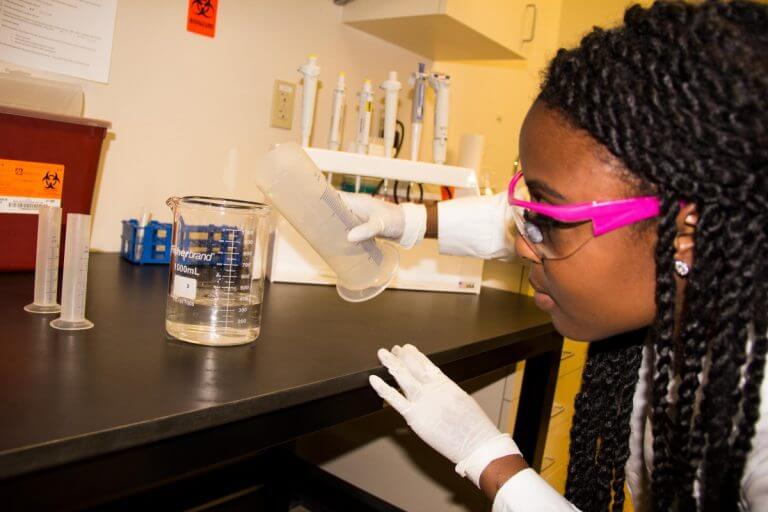
“I met dozens of great friends and got to experience living in Texas. The location of Texas State allowed me numerous opportunities to do all sorts of things: concerts, professional sporting events, etc. The best part was the weather.” – Texas State exchange student
Conveniently located in the Texas Hill Country – nestled at the crossroads between Western, Central and Southern Texas – Texas State University (TXST) is home to a growing community of 40,000 ambitious dreamers and doers.
Students are drawn to this cutting-edge campus year after year, eager for a taste of America’s iconic blackland prairies and intrigued by this unique institution. With a picturesque base along the banks of the San Marcos River, plus the Round Rock Campus set just north of Austin, learners here can make the most of two thriving metropolitan regions.
The Department of Psychology at Texas State is ideal for those seeking the quintessential US education within this specialist field. Offering a range of BA and BS qualifications, plus an MA in Psychological Research, this research-centered institution provides outstanding teaching from high-caliber faculty.

“The mission of the Department of Psychology is to provide an excellent education for the undergraduate and graduate students who take our courses, taught by dynamic faculty who are also active in their fields,” the department website explains. “We seek to foster the spirit of creative inquiry by improving our students’ ability to read, write and think critically (partly based on research methodology knowledge and skills) about enduring and emerging issues of psychology and human relationships.” This mission resonates with students, as the department has grown 25% in the past 5 years to include nearly 2,000 Psychology majors in 2018.
The department opened the MA in Psychological Research program in 2013, which is designed to prepare students for PhD study or placement in industry. Graduates have been placed in competitive PhD programs throughout the United States. The expanding curriculum includes core courses in statistics and research methods along with options for advanced coursework in data analysis, clinical psychology, health, social psychology, development, cognition and more. The department offers students opportunities for research positions in state-of-the-art labs involving eye tracking, electrophysiology, and sleep, to name just a few. The department most recently established a lab to examine social cognition in children and adults.

One thing students love about the department is that it drives large-scale impact yet maintains a small-scale vibe. It is no crowded space where every student is just a number, but rather a strong, supportive community of like-minded individuals. But it is TXST’s esteemed professors who consistently inspire. On top of being incredibly diverse and globally acknowledged, these faculty have revolutionized contemporary psychological research, allowing us new insights into important psychological issues related to memory, addiction, psychopathology, and stress, among others.
TXST’s Ty Schepis, Associate Professor of Psychology, is a prime example of this, having recently been awarded not one but two prestigious research grants (R01) from the National Institutes of Health (NIH). In total, Dr. Schepis has secured nearly US$1.4 million in NIH grant funding to examine prescription drug misuse and other issues. “Prescription misuse has received significantly greater focus over the past two or three years,” Schepis explains. “Not that misuse was not a serious societal issue before, but the attention from media is a lot more recent. One of the bigger questions we have in our ongoing research is: Does being in school or out of school matter? There is evidence that college students misuse prescriptions differently than young adults who are not in college, and there is evidence that adolescents who drop out have the worst misuse profile. While the evidence suggests that adolescents and young adults who are not enrolled in school or post-high school education are far more likely to misuse prescription drugs, not much is known about motives behind the misuse and whether those motives differ based on whether someone is in school. Students may misuse stimulant medication for very different reasons than those not in school, and we are finding some preliminary evidence of that.” Schepis comments: “The data we are using to ask and answer these questions has changed,” he notes. “I think that’s part of what made the project interesting to NIH now – the idea that we can ask better questions and use better data to answer them.”
![]()
The production of high-impact research is a hallmark of Psychology faculty at TXST, whose faculty hail from across the United States as well as Canada, Israel, Poland, and China. One international faculty member, Assistant Professor Amitai Abramovitch, was named a “Rising Star” by the Association for Psychological Science. As a recognized specialist in neuropsychology and psychopathology, Abramovitch and his team harness the power of cognitive neuropsychology, experimental psychopathology and meta-analytic research methodologies to gain an accurate insight into cognitive functions that drive psychopathological processes. With Dr. Schepis, Dr. Abramovitch, and a growing cadre of clinical faculty members, the department is poised to make a lasting impact in this area of psychology.
“The Psychology Department is committed to expanding its research agenda while retaining its lasting commitment to deliver a high-quality undergraduate and graduate student curriculum,” states the department chair. “Rather than viewing research and teaching as separate goals, the Psychology faculty members strongly support the view that research and teaching are complementary activities. Thus, the Psychology Department’s vision is to gain national and international recognition as a research-oriented, teaching-intensive department.”
Follow the Department of Psychology on Facebook, MAPR Facebook, Twitter, and YouTube
Liked this? Then you’ll love these…
5 UK universities breaking boundaries in Psychology
5 Schools helping us navigate the world through the study of Psychology







